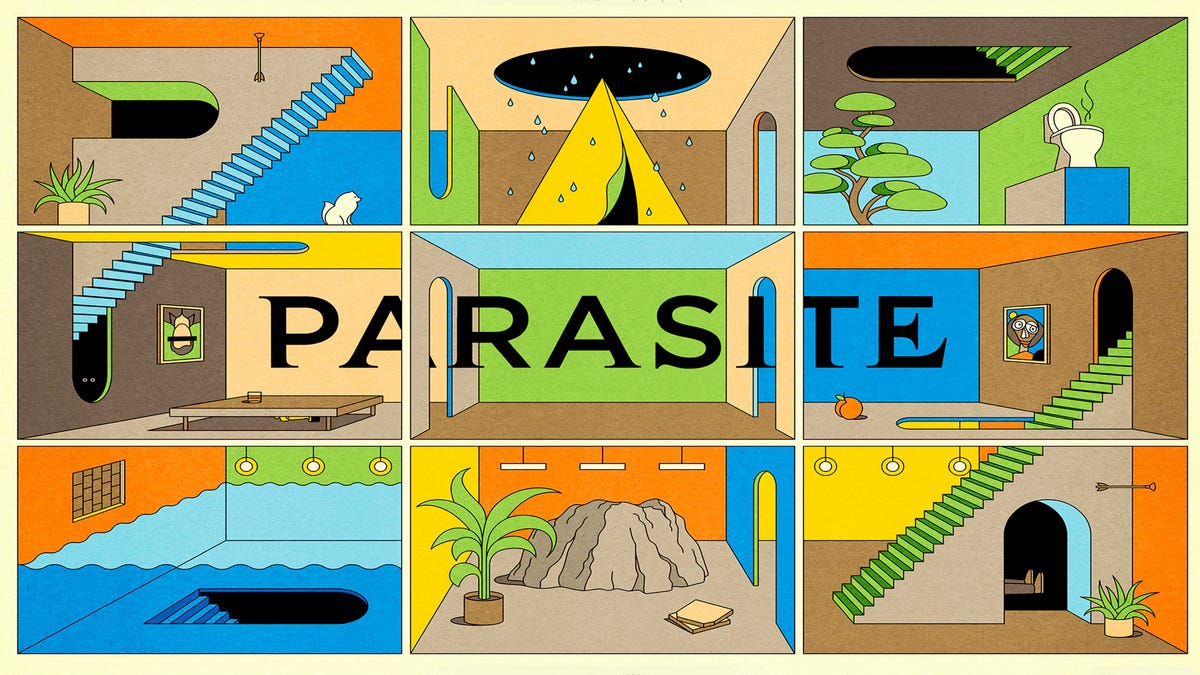Parasite (2019) Netflix – A Masterpiece in Cinematic Storytelling
From the mind of acclaimed director Bong Joon-ho comes “Parasite,” a critically acclaimed film that took the world by storm upon its release in 2019. This South Korean masterpiece explores themes of class disparity, greed, and the lengths people will go to change their circumstances. With its captivating storyline and stellar performances, “Parasite” has become a cultural phenomenon. In this article, we will delve into the genius of this film and discuss why it is a must-watch for any cinephile.
The Plot Unfolds: A Tale of Two Families

“Parasite” revolves around two families from different social classes – the impoverished Kim family and the affluent Park family. The Kims, struggling to make ends meet, infiltrate the lives of the Parks by posing as unrelated skilled workers. What starts as a simple act of deceit soon spirals into a series of unexpected events that challenge our perception of morality and societal norms.
A Satirical Examination of Class
At its heart, “Parasite” is a scathing satire that exposes the stark disparities between the rich and the poor. Through clever storytelling and nuanced performances, the film interrogates the notion of social mobility and the inherent flaws within the system. It forces us to question whether the poor can truly escape their circumstances in a world dominated by wealth and privilege.
A Juggling Act of Tones
One of the most compelling aspects of “Parasite” is its ability to seamlessly shift between different tones. It starts off as a dark comedy, luring the audience with its witty dialogue and eccentric characters. However, as the film progresses, it takes a sharp turn into darker territory, delving into themes of desperation and violence. This tonal juggling act keeps viewers on the edge of their seats and adds depth to the narrative.
The Power of Performances

One cannot discuss “Parasite” without acknowledging the exceptional performances by the cast. From the Kim family’s cunning schemes to the Parks’ obliviousness, every actor brings their character to life with astonishing realism. Song Kang-ho’s portrayal of the Kim patriarch is particularly noteworthy, capturing both the vulnerability and determination of a man striving for a better life.
Exploring the Human Condition
Beyond its social commentary, “Parasite” delves into the complexities of the human condition. It explores the universal desire for a better life, the lengths people will go to protect their loved ones, and the inherent flaws and contradictions within ourselves. Through its multidimensional characters, the film invites introspection and sparks discussions on morality and empathy.
A Cinematic Masterclass
Bong Joon-ho’s masterful direction and storytelling techniques elevate “Parasite” to a level of cinematic brilliance. The film’s meticulous cinematography, striking visuals, and meticulous attention to detail immerse viewers in a world that feels both familiar and unsettling. Each frame is carefully crafted, adding layers of symbolism and meaning that further enrich the viewing experience.
A Reminder of the Power of Cinema
“Parasite” is a testament to the power of cinema to challenge conventions, evoke emotions, and initiate discussions. It pushes boundaries, defies genre expectations, and leaves a lasting impact on its audience. This film serves as a reminder that storytelling is an art form that can transcend borders and connect with people on a profound level.
Conclusion
In conclusion, “Parasite” is an extraordinary film that not only entertains but also provokes thought and sparks conversations. Its exploration of class disparity, its seamless tonal shifts, and its exceptional performances make it a true masterpiece in cinematic storytelling. By watching “Parasite,” audiences are invited to examine their own biases, question societal structures, and confront uncomfortable truths. This is a film that demands to be seen and appreciated for its brilliance.
FAQs
1. What is the significance of the title “Parasite”?
“Parasite” refers to the metaphorical relationship between the two families depicted in the film. It symbolizes the exploitation and dependence between the rich and the poor, highlighting the oppressive nature of social hierarchies.
2. Why did “Parasite” receive such critical acclaim?
“Parasite” received critical acclaim for its exceptional storytelling, nuanced performances, and thought-provoking social commentary. It effectively captures the complexities of class disparity and presents them in a compelling and entertaining manner.
3. Is “Parasite” available on Netflix?
Yes, “Parasite” is available to stream on Netflix, allowing audiences worldwide to experience this cinematic masterpiece from the comfort of their own homes.
4. How did “Parasite” impact the international film industry?
“Parasite” made history by becoming the first South Korean film to win the Palme d’Or at the Cannes Film Festival and the first non-English language film to win the Best Picture award at the Academy Awards. Its success opened doors for more diverse stories and non-Western cinema to gain recognition on a global scale.
5. Can “Parasite” be considered a genre-defying film?
Yes, “Parasite” defies traditional genre categorizations by seamlessly blending elements of dark comedy, drama, and thriller. This genre-fluidity is one of the reasons why the film stands out and captivates audiences around the world.

